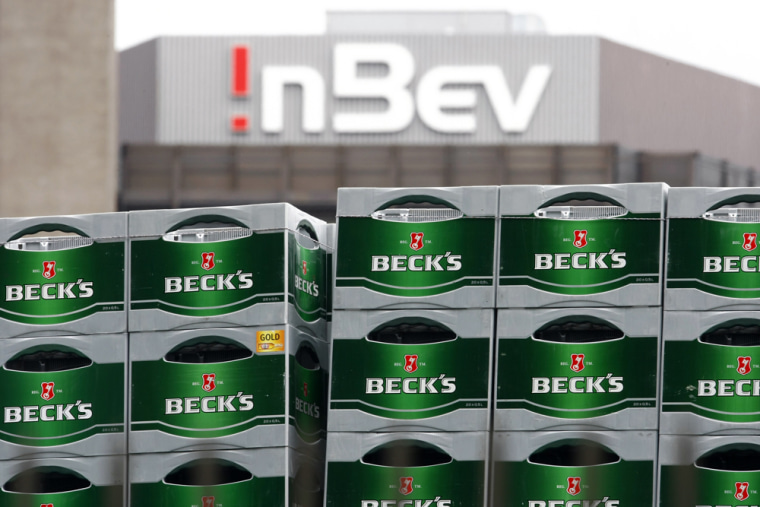The maker of the King of Beers has agreed to go to work for the Belgian brewer InBev SA.
Anheuser Busch Cos. said early Monday it had agreed to a sweetened $52 billion takeover bid from InBev, creating the world’s largest brewer and heading off what was shaping up as an acrimonious fight for the maker of Budweiser and Bud Light beers. Inbev brands include Stella Artois, Beck’s and Bass.
The combined company will be called Anheuser-Busch InBev. As of the end of last week, InBev said it would be the world’s third largest consumer products company by market capitalization after Procter & Gamble of the United States and Nestle SA of Switzerland.
The Anheuser-Busch board accepted the higher takeover offer Sunday night from Belgian-based InBev, according to a joint press release. The deal is expected to close by year-end.
“What consumers care is that their Bud will always be their Bud, and that’s what we’re committed to, not only the product, the quality, the beer ... but also the heritage, the breweries, who brews the beers, and everything that’s connected to the breweries,” InBev CEO Carlos Brito said in a media conference call.
For InBev, the deal gives an aggressive company an iconic beer brand — Budweiser — to sell into emerging markets such as China and Brazil where it has already established a wide network.
InBev is the world’s second-largest beer-maker, narrowly behind SABMiller. Swallowing Anheuser-Busch sees it leap ahead, capturing half of the U.S. beer market and a fifth of China and Russia.
Brito will be chief executive officer of the combined company, while Anheuser-Busch CEO August Busch IV will step back into a non-executive role. He will be a member of the new company’s board alongside one other nominee from Anheuser-Busch, yet to be named.
“We went through some difficult times together, and our employees did as well, but in the end this is a friendly transaction and we are going to work very hard for our new shareholders,” Busch told reporters.
Shareholders will receive $70 a share, a $5 increase over the offer Anheuser-Busch rejected in June. Both companies’ shareholders must approve the deal, as must U.S. and EU antitrust regulators.
Anheuser-Busch shares rose 53 cents to $67.03 in afternoon trading.
The deal drew the attention of Mexico’s Grupo Modelo. Anheuser-Busch also owns a 50 percent share in Grupo Modelo, which said in a statement Monday that its relationship with Anheuser-Busch gives it consent rights to the deal.
But Brito told reporters that he didn’t “see any impediments coming from Modelo” and he was in “positive” talks about keeping the company as a partner. He said there were no immediate plans to buy out Modelo or divest Anheuser-Busch’s stake in the company.
InBev said it plans to use St. Louis as its North American headquarters, and that it will keep open all 12 of Anheuser-Busch’s North American breweries.
Brito tried to reassure workers worried about possible job loses, saying the company could instead expect “growth and investment” despite Anheuser-Busch’s existing plans to shed 1,185 positions — mostly by offering early retirement and not filling existing vacancies.
The companies will, however, sell off “noncore assets” that they would not name to raise some $7 billion to finance the deal. InBev will also borrow $45 billion and plans to issue new shares to raise another $9.8 billion.
Shareholders won’t see much joy in the short-term. InBev warned of lower dividends and no benefit to earnings per share until 2010.
But it is promising longer-term rewards in a stalling market. Beer sales in North America and Europe are flat as drinkers turn to wine and spirits. InBev has compensated by finding new drinkers in Latin America, eastern Europe and Asia that will now be handed a cold Bud.
InBev cost synergies of at least $1.5 billion a year by 2011 over three years. Most of that will come from managing the supply chain better. InBev’s sharp eye on costs — which forces managers to justify every cent spent — will also play a major part.
Monday’s kiss-and-make-up announcement from both companies came after several weeks of guns blazing. InBev said on June 11 it wanted to buy Anheuser-Busch, which distributes its beers in the U.S.
Anheuser-Busch shrugged off the first offer as two low, prompting InBev to seek the removal of all Anheuser’s board members. Anheuser counterattacked, calling InBev’s bid an “illegal scheme” because the company failed to mention that it owned a brewery in Cuba.
Few products are associated with America as much as Budweiser, which its owner calls the King of Beers. Its Clydesdale horses are fixtures of Super Bowl ads, and even the label is red, white and blue, with an eagle swooping through the “A.”
To some in St. Louis, losing Anheuser-Busch to a foreign buyer meant losing a little bit of history. From college buildings to theme parks to offices to the stadium where the Cardinals play baseball, the Busch name is virtually everywhere in the Gateway City.
Despite more than 600 years of brewing beer in Belgium, InBev is more rootless. Although based in Leuven, Belgium, it is run by a Brazilian management team and sells most of its beer outside Europe.
It owns a massive portfolio of local brands from Siberia to Argentina that rarely travel. InBev has only recently started to push its two best-known brands — Stella Artois and Beck’s — more widely.
